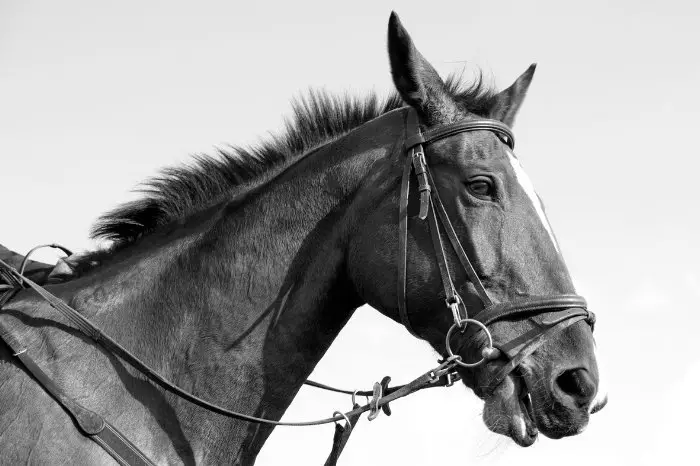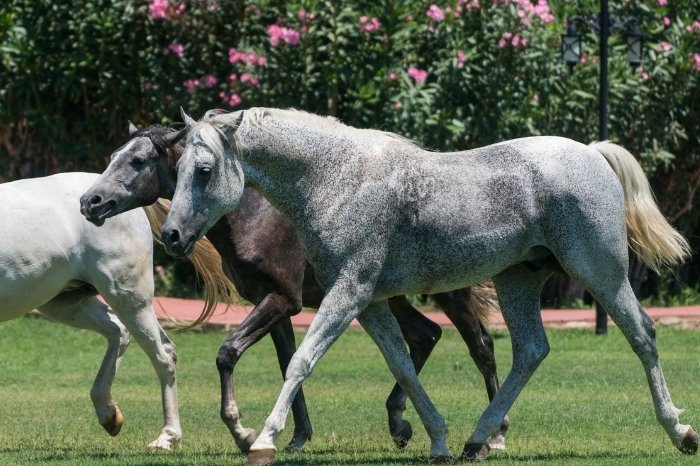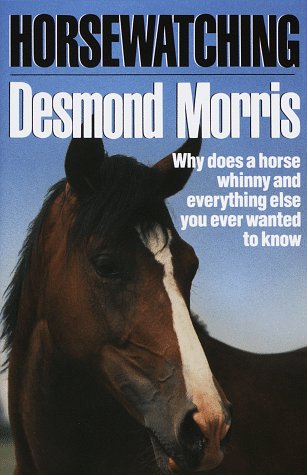Last Updated on December 25, 2021
All horse riders and lovers will agree that at times, horses can make some strange and funny noises! They will neigh, whinny, snort, squeal, and nicker, all for a range of different reasons. But why do horses whinny and what does it mean?
Horses will whinny for various reasons, and this noise-making behavior can mean many different things. Let’s take a look at why horses whinny and learn about what they might be trying to tell us.
What Does A Horse’s Whinny Sound Like?
A horse’s whinny is a loud and very distinctive sound. Once you have heard a whinny, also known as a neigh, you will be able to recognize it anywhere!
The whinny of a horse comes from both the mouth and the nose. The horse will open its mouth to vocalize the sound, and the nostrils will flutter as air is expelled. The head and neck of the horse are normally extended whilst it is neighing.
This great little video clip shows a perfect example of a horse whinnying:
Why Do Horses Whinny?
Horses whinny as a form of communication. They mainly whinny to tell other horses where they are and to locate their equine friends. When one horse neighs its favorite horse companions will normally neigh back.
Horses will mostly neigh when they have been separated from their friends, or when they are reunited. So, if your horse cannot see his best friend, he will neigh to try and locate him. If his friend neighs back, they will normally be satisfied that they know where each other is.
However, if they do not hear each other, they can get quite distressed and will neigh frequently until they are reunited. And when they finally see each other again, they will do a series of low, quiet whinnies to greet each other.
It is important to remember that horses do not whinny to show fear or pain. They are prey animals, and to neigh when they are in a vulnerable situation would put them even more at risk.
You might think from the movies that horses whinny a lot when they are galloping, but this is not the case. A galloping horse would find it difficult to neigh and has no real need to do so. In the movies, the horse neighing sounds are normally added to the soundtrack!
Do Horses Have Different Types Of Whinny?
Studies have shown that the length of the whinny varies according to the distress levels of the horse, as well as the pitch of the whinny.
A whinny that is high pitched and longer is normally an indication of distress. A lower-pitched and shorter whinny shows lower levels of distress. As a horse owner, you can learn to tell the difference between the types of whinny your horse does.
Horsewatching: Why does a horse whinny and everything else you ever wanted to know
For example, if your horse is left alone in the barn for some reason, he may continuously carry out very long and high-pitched whinnies. This is because he has been separated from his companions and is very distressed.
On the other hand, if your horse is in a group of other horses and one of them is moved to a field nearby, they may whinny to each other to locate where they are. This will be a shorter and lower-pitched whinny.
Check Out Different Ways To Braid A Horse’s Mane
What Other Noises Do Horses Make?
Horses communicate through a range of different noises, not just neighing. Let’s take a look at all the other noises that horses make:
-
Snort
Horses make a range of different snorting sounds, and it is not fully understood what their purpose is. Often the horse may be snorting to clear his nostrils, but on other occasions, the snort might be a form of communication.
For example, if a horse sees something he is unsure of, he will often do a very loud and fierce snort. This is almost an expression of surprise and might be used to warn other horses of potential danger.
Horses also let out a long, slow snort when they are feeling relaxed – similar to a very big sigh. This is a sign of contentment, not boredom!

And when a horse is checking out something new, he will do a series of very short snorts.
Whatever the reason for your horse snorting, studies have shown that happier horses snort more! So, if your equine friend makes a lot of snorting noises, chances are he is happy and enjoying life.
Read more about the Reasons Why A Horse Is Losing Hair
-
Nicker
One of the most adorable sounds that horses make is something called a ‘nicker’. This sounds almost like a little chuckling noise made through the nostrils.
Horses use this sound to welcome and reassure their closest equine friends. You will often hear a mare nickering to her foal, to keep it safe and reinforce the relationship.
If your horse nickers at you, you should feel very loved as he saves this sound for his favorite companions! However, if he mainly nickers at dinner time, he might just love you for the food you bring!
-
Squeal
If you’ve ever been near a group of horses during the breeding season, you will normally hear quite a lot of squealing! This is a high-pitched noise, often made when new horses meet for the first time. Mares tend to squeal a lot more than geldings.
When a horse squeals it will often arch its neck and lash out with a foreleg at the same time. If a mare is in season, she will use different squealing noises to indicate to the stallion if she is ready to be mated or not.

Horses will also squeal from excitement. You will often hear this noise when a group of horses are playing in the field. There is nothing more fun than watching a herd of excited horses galloping and squealing around a new paddock!
Summary- What Does It Mean When A Horse Whinnies?
So, as we have learned, horses whinny as a form of communication, to locate their favorite equine friends. They have different pitches and lengths of whinny according to how distressed they are. Horses also make other noises including squeals, snorts, and nickers.
We’d love to hear about your experiences – do you know a horse that seems to neigh all the time? Or is your pony one that nickers every time he sees you? Add a comment below this post and we’ll get back to you!

Kate Chalmers is a qualified veterinary nurse who has specialized in horse care for the vast majority of her career. She has been around horses since she was a child, starting out riding ponies and helping out at the local stables before going on to college to study Horse Care & Management. She has backed and trained many horses during her lifetime and competed in various equestrian sports at different levels.
After Kate qualified as a veterinary nurse, she provided nursing care to the patients of a large equine veterinary hospital for many years. She then went on to teach horse care and veterinary nursing at one of the top colleges in the country. This has led to an in-depth knowledge of the care needs of horses and their various medical ailments, as well as a life-long passion for educating horse owners on how to provide the best possible care for their four-legged friends.
Kate Chalmers BSc (Hons) CVN, Dip AVN (Equine) Dip HE CVN EVN VN A1 PGCE

